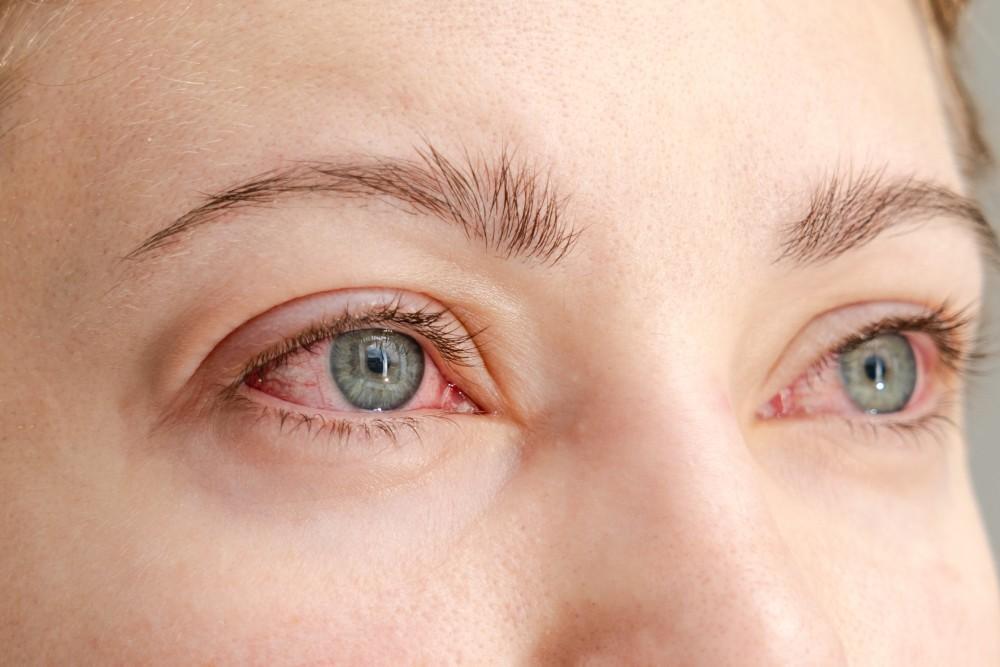
Coping with Seasonal Allergies? 5 Ways to Relieve Red, Itchy Eyes

You’re not alone if seasonal allergies leave your eyes red, itchy, and watery. Pollen, dust, and other airborne allergens can trigger uncomfortable eye symptoms that make daily activities a struggle.
The good news? There are effective ways to soothe your eyes and find relief, and that’s just what Nicanor Lacsina, OD, and Yelena Pinkhasova, OD, are here to discuss.
Here are five ways to relieve red, itchy eyes and how the Bainbridge Eye Care team can help.
1. Reduce your exposure to allergens
The best way to prevent allergy flare-ups is to minimize contact with triggers like pollen, pet dander, and mold. Try these tips:
- Wear sunglasses outdoors to shield your eyes from airborne allergens
- Wash your face and hands after spending time outside to remove pollen
- Use an air purifier at home to filter out allergens
- Keep a pet-free room in your house (if you’re allergic to dander)
- Vacuum regularly
Tip: Most weather channels feature allergy reports, so check the daily allergy report. You might consider keeping your windows closed and exercising inside on any high pollen count days.
2. Use allergy eye drops
Over-the-counter or prescription antihistamine eye drops can quickly relieve itching and redness by blocking the body’s allergic response. If you experience dryness and allergies, artificial tears can help flush out allergens and keep your eyes comfortable.
Our team may also recommend prescription eye drops.
3. Apply a cold compress
A damp washcloth over your closed eyes can reduce swelling and irritation caused by allergies. Apply for 5-10 minutes as needed to soothe discomfort and refresh tired, itchy eyes.
4. Take your oral allergy medications as directed
If your eye allergies are severe, an oral antihistamine like cetirizine or loratadine may help reduce allergy symptoms, including itchy, watery eyes.
If you regularly drink fruit juice, you might want to double-check that you’re not drinking juice too close to when you take your allergy medication. It could be unknowingly reducing the effectiveness of your medication.
Best practice? Avoid drinking fruit juice within two hours of certain kinds of allergy medication.
5. Consider immunotherapy
Our team may recommend immunotherapy if you can’t avoid your allergens or if medications and eye drops don’t alleviate your symptoms.
Immunotherapy for eye allergies helps reduce sensitivity to allergens by gradually exposing your immune system to small, controlled amounts of the allergen. This treatment, often administered as allergy shots or sublingual tablets, trains your body to build tolerance over time, which leads to fewer and less severe allergic reactions.
Allergy shots can also help prevent new allergies and the progression of allergic rhinitis to asthma.
Unlike antihistamines or eye drops that provide temporary symptom relief, immunotherapy addresses the root cause of allergies for long-term improvement.
It’s especially beneficial if you have persistent or severe allergic conjunctivitis and don't respond well to standard treatments.
What not to do if you have eye allergies
If you have eye allergies, what you don’t do is as important as what you do.
Do not rub your eyes
Rubbing may feel like a quick fix, but it releases more histamines, making redness and itching worse. Instead, gently rinse your eyes with cool water or lubricating eye drops to relieve irritation.
Do not ignore your symptoms
With so many allergy treatments at your fingertips — from eye drops to oral medications to immunotherapy — there’s no need to power through your symptoms unaided. Our team can help you find relief from your eye allergies.
Get help for eye allergies in the Bronx
If your allergy symptoms are persistent, worsening, or affecting your vision, it’s time to see Dr. Lacsina or Dr. Pinkhasova. They can help determine if your discomfort is due to allergies or another eye condition and recommend the best treatment for lasting relief.
With spring allergies in full force, now is the perfect time to call 718-306-9127 and get the relief you need, or request an appointment online today.
You Might Also Enjoy...


Eye-Friendly Habits You Can Start Today

Vision Changes with Age: What’s Normal, and What’s Cause for Concern?

Understanding How Diabetes Can Diminish Your Ocular Health and Impair Your Vision

5 Signs of an Eye Allergy - And What to Do About Them

